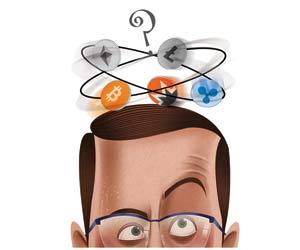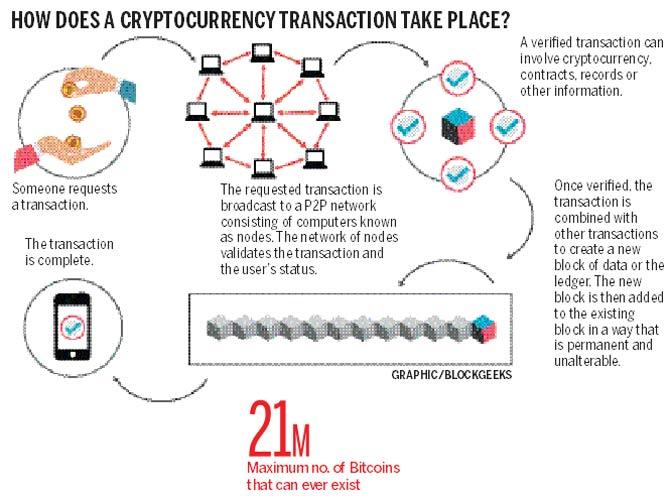Ever since 2009, when the now infamous Bitcoin was launched, the world's interest in cryptocurrency has steadily peaked. But it still eludes the masses and several governments - India included - because of its lack of sustainability and safety

Ever since 2009, when the now infamous Bitcoin was launched, the world's interest in cryptocurrency has steadily peaked. But it still eludes the masses and several governments - India included - because of its lack of sustainability and safety. Even so, Bitcoin and other forms of cryptocurrency have steadily gained prominence. This week, mid-day breaks down the bubble around Bitcoin and other cryptocurrencies.

Illustration/Uday Mohite
What is cryptocurrency?
Cryptocurrency is a medium of digital exchange that employs cryptography for secure transactions. Unlike the traditional banking system, this form of currency exchange is completely decentralised. The first such cryptocurrency was Bitcoin, made by one (or many) Satoshi Nakamoto, whose real identity still eludes the world. Nakamoto proposed the creation of Bitcoin in a 2008 white paper, as a 'peer-to-peer network to prevent double-spending'. The paper also underlines the blockchain database that Bitcoin still operates on. While announcing Bitcoin, Nakamoto said, "It's completely decentralised with no server or central authority." That is the system Bitcoin and its derivatives operate on to this day. Its ledger is managed by a community of mutually distrustful 'miners', who are paid a part of the transaction for carrying it out.
The earliest founders
One of the earliest attempts at creating such a currency was by cryptographer David Chaum, who invented 'Digicash' in the 1990s, based on his personally devised algorithm made in the 1980s, which used encryption for transferring funds electronically. However, Chaum's endeavour failed, as The Netherlands - the country his company was based out of - put regulations on the usage of Digicash, limiting its use. Chaum's company then closed doors. Other notable cryptocurrency attempts were BitGold, Hashcash and B-Money.

Is it legal in India?
While cryptocurrency seeks to make transactions anonymous and secure, it has had its downfalls. In addition to that, several governments have made its usage illegal, while others have allowed it with some regulation. It is legal in India, but the Reserve Bank of India (RBI) neither supports it, nor has any plans, as of now, to frame regulations for it. Speaking about Bitcoin, former RBI governor K C Chakrabarty said in 2013, "Those who understand and want to take the risk are free to do so with their money. Whether it is legal or illegal, we do not know; so, people should be cautious [and] should understand before taking the plunge."
 Subscribe today by clicking the link and stay updated with the latest news!" Click here!
Subscribe today by clicking the link and stay updated with the latest news!" Click here!









